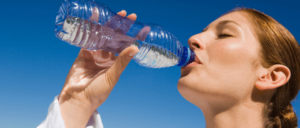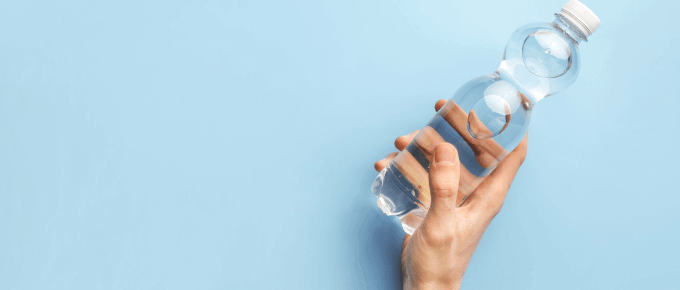Did you know that per- and polyfluoroalkyl chemicals, or PFAS, are present in several types of bottled water? A class of synthetic chemicals known as PFAS has been connected to several health issues, such as cancer, issues with reproduction, and developmental issues in children.
So, which bottled water brands don’t contain PFAS? And how do you identify PFAS-free bottled water? We’ll address all of your concerns regarding PFAS in bottled water in this blog article, and will provide a list of brands that don’t contain PFAS.
What are PFAS?
PFAS, or per- and polyfluoroalkyl substances are a class of synthetic compounds that have been found in many different products, such as firefighting foam, water-resistant clothes, and nonstick cookware. The reason PFAS are referred to as “forever chemicals” is that they can build up in the human body and are incredibly persistent in the environment.

There are a few things you can do to lessen your exposure to these dangerous chemicals while the US Environmental Protection Agency (EPA) works on creating new laws for PFAS:
- Drink filtered water
- Avoid products that contain PFAS, such as nonstick cookware and water-resistant clothing
- Often wash your hands
- Avoid eating fish from contaminated waters
Are PFAS in bottled water?
Yes, bottled water does contain PFAS. According to a study conducted by the Environmental Working Group, 24 out of 43 brands of bottled water that were tested had PFAS identified in them. While most tests had PFAS concentrations below the US Environmental Protection Agency’s (EPA) health advisory thresholds, several samples had levels above that.
Companies that sell bottled water have several options for lowering the amount of PFAS in their goods, such as:
- Using source water that is low in PFAS
- Using PFAS-removal filtering systems
- Checking for PFAS in their products and, if required, lowering PFAS levels
Which brands of bottled water are PFAS free?
The following brands of bottled water have been tested to be PFAS free:
- Boxed Water Is Better
- Crystal Geyser
- Fiji Water
- Poland Spring
- Polar Arctic Water
- Primo Purified Water
- Pur Aqua
How do I know if my water has PFAS?
If you are concerned about PFAS in your drinking water, there are a few ways to know if your water has PFAS. There are also a number of home water filters that can remove PFAS from water.

- Get a laboratory to test your water. PFAS testing is available at several laboratories. The National Environmental Laboratory Accreditation Program (NELAP) website has a list of recognized laboratories.
- Look for third-party certification. Third-party certifiers like NSF International and Underwriters Laboratories (UL) test goods for PFAS on behalf of several water filter and bottled water firms. A certification mark on a product’s label indicates that it has undergone testing and has passed requirements, including those for the elimination of PFAS.
- Contact your local water utility. If your water comes from a public water system, you may find out if your local water company does PFAS testing on its water by getting in touch with them. Nowadays, PFAS testing is a common practice in public water systems, and in certain cases, it is mandated by law.
Which water filters remove PFAS?
The following water filters have been certified to remove PFAS:
How to identify PFAS-free bottled water
When you look for brands of bottled water that have undergone testing to ensure they are free of PFAS. Reverse osmosis filtration is another method you can search for, as it is a good way to get rid of PFAS from water.
- Look for brands that use reverse osmosis filtration. A particularly efficient method of getting rid of PFAS from water is reverse osmosis. It’s a positive indication that a bottled water brand is PFAS-free if you notice that it uses reverse osmosis filtration.
- Avoid brands that have been linked to PFAS contamination in the news. A few brands of bottled water have already been connected to PFAS contamination. You should stay away from these brands.
Benefits of drinking PFAS-free water
Drinking PFAS-free water is important because PFAS have been linked to a number of health problems, including cancer, reproductive problems, and developmental problems in children.
It also has a number of benefits, including:
- Reduced risk of cancer. Exposure to PFAS has been associated with a higher risk of renal, testicular, and liver cancers. Your chance of getting these malignancies can be decreased by drinking water free of PFAS.
- Improved reproductive health. Low birth weight, miscarriage, and infertility have all been related to PFAS exposure. Your chances of having a healthy child can be increased and your reproductive health can be enhanced by drinking water free of PFAS.
- Enhanced child development. PFAS exposure has been linked to delayed development, learning disabilities, and behavioral problems in children. Drinking PFAS-free water can help to improve child development and protect children from these harmful effects.
- Stronger immune system. PFAS exposure can weaken the immune system and make people more susceptible to infections. People’s immune systems can be strengthened and their risk of illness reduced by consuming PFAS-free water.
- Reduced risk of other health problems. PFAS exposure has also been linked to a number of other health problems, including thyroid disease, high cholesterol, and obesity. Drinking PFAS-free water can help to reduce your risk of developing these health problems.
Sum-up
PFAS are a serious concern for public health. If you are concerned about PFAS in your drinking water, you can choose to drink PFAS-free bottled water or use a water filter that removes PFAS.

Leave a Reply